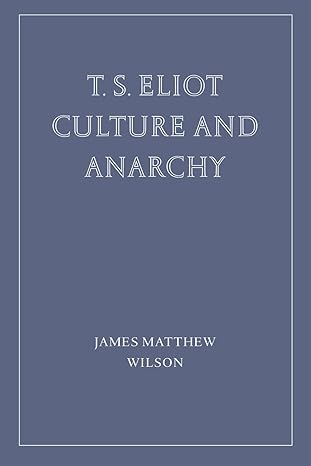
By James Matthew Wilson.
Wiseblood Books, 2024.
Paperback, 72 pages, $5.
Reviewed by Daniel James Sundahl.
Matthew Arnold’s thesis in The Function of Criticism at the Present Time reads much like a response by Arnold to suggestions that he assigned too much importance to criticism which would argue in turn that the critical effort is superior to the creative effort of the human spirit.
He had a point. When looking about he could proclaim that in the first quarter of his own century there was plenty of energy, plenty of creative force, but by many who did not know enough. Thus Byron was empty of matter, Shelley was incoherent, and Wordsworth lacked completeness and variety. How much better they would have been had they cared more for books.
Arnold cared deeply for books and his outlook was not restricted to literary criticism per se but saw it as an important branch of criticism in general. In other words, “in general” he was an advocate of social and cultural criticism, one part of which was literary criticism that he believed had become too parochial.
His advocacy for literary criticism led to his “critical” response to the social turmoil of his own day and age where we find the phrase “culture and anarchy” which belongs to Arnold’s jaundiced but serious eye. Criticism became Arnold’s self-imposed intent to broaden the horizons of his countrymen leading to a better world of sweetness and light: a liberal, cultural prophet, in other words, but without religious dogma.
Arnold rather advocates strengthening the role of culture in public life while also advocating more government funding of public school systems which would include education in the arts reinforcing his belief in the moral and humanistic value of culture which would diminish the sum of human misery.
Well, he may have been mislead by his liberalism.
Let us turn, then, to James Matthew Wilson’s incisive 60 page monograph T. S. Eliot: Culture and Anarchy, which questions whether culture can become a new civil religion to which everyone could conform in a forthcoming mass egalitarian age, disciplining the heart and creating order without any fixed religious beliefs.
For Arnold, culture would stave off “anarchy by infinitely deferring full confrontation with the indefinably, opaque, recessive, and slippery thing that culture actually was.” When Wilson thus reads Arnold, with some appreciation, he does so by posing T. S. Eliot’s response to the social eruptions of his own modern world. When Arnold uses words, they swirl awkwardly together which became Eliot’s task to worry “those words toward precise explanations.”
More so, for Eliot, history is testimony that cultural religion is not finally desirable but is rather an intellectual evasion that prevents us from encountering the truth without dogmatic assertions.
One might think of matters this way: Eliot appropriates Arnold’s liberal vision of culture, but conservatively converts that vision. Culture’s work is not merely sweetness and light but contributes to an “ideal order” of tradition which is above if not sealed off from the “poet’s heart” that is supposed to palpate with feeling.
At this point, still early in the monograph, Wilson points to Eliot’s definition of classicism opposed to romanticism. Eliot’s proclamation signals a break with the subjective and emotive tendencies common in the art for art’s sake aestheticism, which had become a fawning over the mildly sordid like tobacco and absinthe, while burning always with a hard gem-like flame.
For Eliot, however, as Wilson makes clear, such is still an early phase in his critical thinking which will develop more profoundly after his conversion to Anglican Christianity announced in his 1928 group of essays For Lancelot Andrewes. Eliot described this work as classicist in literature, royalist in politics, and Anglican Catholic in religion.
Wilson’s monograph then provides the reader with some biographical background including Eliot’s time at Harvard where he studied with Santayana and Babbitt. Wilson notes that these influences deepened Eliot’s interest in classicism and humanism. What was slowly emerging were binding foundational truths which for Eliot led to the theological root of things, the permanent things.
Worship of culture was counterfeit.
What was needed was a rebirth of religion, which must be really religion and not an Arnoldian substitution. Wilson argues just so by noting that it’s not enough to worship edifying maxims since morality and religion are not the same thing.
According to Wilson, and properly so, Eliot came in time to argue that religion must be granted a more prominent place in our public life albeit all questions depended on having a right theology.
As we therefore know, Eliot labored to change his own age not through what he experienced privately but through the power of the moral imagination, which included the tragic view of life. He was an ethical poet bent upon redeeming the time from the worshipers of strange gods.
Arnold intended to redeem his own day and age through culture. Eliot intended to redeem the times by recovering the profound theological roots that made civilization possible.
Russell Kirk wrote his own reflection upon T.S. Eliot. How would Kirk read Wilson’s monograph on Eliot? I believe Dr. Kirk would respond to Wilson by welcoming an ally, another champion of the moral imagination laboring under the light of the same communion candle.
Daniel James Sundahl is Emeritus Professor in English and American Studies at Hillsdale College where he taught for thirty-three years.
Support the University Bookman
The Bookman is provided free of charge and without ads to all readers. Would you please consider supporting the work of the Bookman with a gift of $5? Contributions of any amount are needed and appreciated!